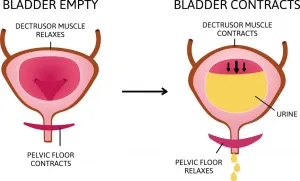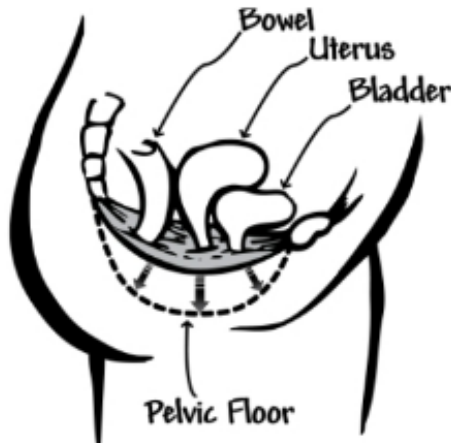Last summer, I was exploring my new home of Fort Collins and decided to take a hike up to Horsetooth Mountain. With the dry heat and beating sun, I was making sure to stay hydrated. On my way home I had a strong desire to void but I was so close to home that I didn’t want to stop. I took a couple of deep breaths, performed+5 quick pelvic floor contractions (or “Kegels”), and *poof* the urge was temporarily suppressed, and I was able to make it home with no leaking. Do you know why or how this happens?
Do you know what the relationship is between the bladder and the pelvic floor? If not – read on!
The bladder and the pelvic floor have a very close relationship. They’re constantly working to keep us content. Our bladder is a muscle and so is the pelvic floor therefore they are both able to contract and relax. When our bladder is relaxed, it gradually fills up with urine while our pelvic floor muscles are contracted working to keep our pee in and our pants dry! The opposite needs to happen when we go to the bathroom – our bladder needs to contract, and our pelvic floor muscles need to relax so that we can void successfully. In the story above, my brain was sent the urge to urinate by my full bladder however I was able to relax the bladder by contracting the pelvic floor – the contracted pelvic floor told my brain that my bladder muscle needed to relax, and I was able to stay continent. Then, when I was finally able to sit on a toilet, my pelvic floor was able to relax and by bladder contracted to allow urination to occur. Sometimes we have difficulty getting our pelvic floor muscles to relax while we are urinating/defecating which can lead to incomplete emptying, a weak stream, spraying stream or even constipation. Keep reading to find out ways to prevent these from happening!

Here are some tips for optimal toileting habits to keep your pelvic floor happy and healthy:
- Relax and take your time when going to the bathroom – do not rush and “power pee” as this does not let the pelvic floor muscles fully relax
- Consume around ½ body weight in ounces of liquid per day with ⅔ of that being water – concentrated urine (when we haven’t had enough water to drink) can lead to bladder irritation which may in turn lead to leakage. Increased fluid consumption may be indicated when doing physical activity or in hot climates
- Use a squatting potting when pooping so that your knees are above your hips helps to relax the pelvic floor as well as increases the rectal canal angle to facilitate optimal decent to allow for a bowel movement to occur
- Breathe! Do not strain, bear down, or hold your breath while pooping. Use your inhale to help relax the pelvic floor.

- Sit down on the toilet, yes even in public, as this allows the pelvic floor muscles to relax
- Ensure that you are getting enough fiber to reduce constipation. Chronic constipation can lead to straining of the pelvic floor muscles which over time can cause weakening Avoid “just in case” peeing as this can cause the brain to think that you need to urinate prior to your bladder actually being full which may in turn lead to frequency or urgency Avoid peeing in the shower as this may cause the brain to associate the sound of running water with the signal to pee. You don’t want to need to pee every time you do the dishes! If your feel a sudden, strong urge to void and are unable to make it to a toilet – STOP! Take several deep breathes and then perform 5 quick pelvic floor contractions. Now you may proceed with what you were or calmly walk to the bathroom without leaking.

Contact us if you have been guilty of one of these toiling mistakes and would like to learn more about keeping your pelvic floor happy and healthy!

This blog was written by our very own Pelvic/Women’s Specialist, Dr. Sam Greig.

